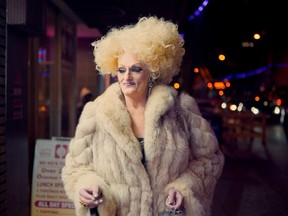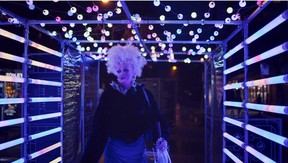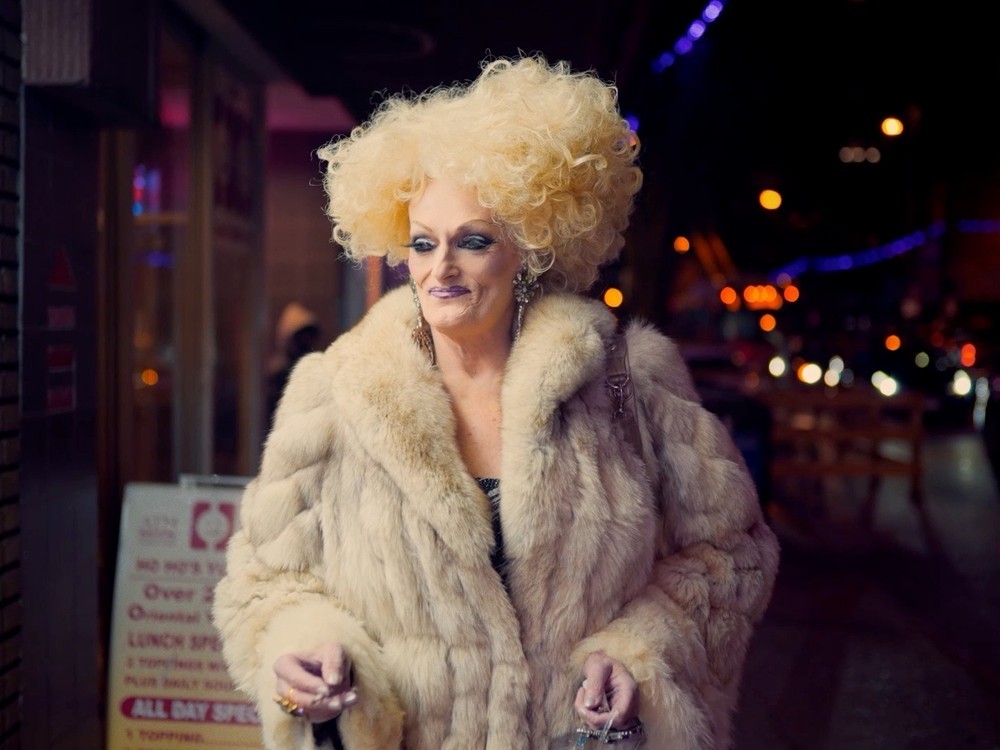
Reviews and recommendations are unbiased and products are independently selected. Postmedia may earn an affiliate commission from purchases made through links on this page.
Article content
It would be hard to find a more suitable subject for a documentary than Oliv Howe, the Empress of Vancouver.
Advertisement 2
Story continues below
Article content
That’s exactly what filmmaker Dave Rodden-Shortt thought in 2018 when he met up with the trans icon while researching another project. The filmmaker was working on Beyond the Facade, a series of short films focusing on Vancouver’s untold histories. Howe was enlisted to share insight into the history of the city’s queer scene in the 1980s, a crucial period for the community and one that Howe had colourfully lived through.
Article content
“I met her for coffee and she talked for over an hour,” Rodden-Shortt says. “I was so fascinated by the stories she was telling, I found her hilarious and smart. Her recollection of the past, she has so many details. People go to her to identify people in archival photos. There’s a local Facebook page where people post stuff from the archives, and they are like ‘Oliv, who is this?’ Invariably, she knows who it is. She knows their first and last name.”
Advertisement 3
Story continues below
Article content
But it wasn’t just that Howe was a fountain of information and a living witness to Vancouver’s queer-rights movement in the 1980s. Her own story of survival and perseverance and community-building made for an interesting character study on its own.
So Rodden-Shortt, who is now Vancouver-based but spent much of his childhood in Calgary, made Howe the focus of his feature-length debut, The Empress of Vancouver, which will screen Nov. 26 at the Globe Cinema as part of CUFF Docs.
Part of the documentary traces Howe’s childhood on a farm near Fredericton and her escape to Montreal at the age of 10, where she would eventually become part of a close-knit queer community. She did drag for the first time at the age of 14 in New York and eventually became a fixture in Vancouver’s queer and drag scenes. In 1981, she was elected the 10th Empress of Vancouver by the Dogwood Monarchist Society, which led to her leading Canada’s first official pride parade.
Advertisement 4
Story continues below
Article content
The film is structured around Oliv Howe’s plans to base a series of shows around the 40th anniversary of her being crowned Empress of Vancouver, which allows Rodden-Shortt to present several elaborate and entertaining performance pieces within the documentary.
Still, he says he was initially concerned that there would be a lack of archival visuals to tell the story. He feared photographs and other archival material from the period of Howe’s coronation and one-year reign would be in short supply. Photographs were discouraged in certain gay bars because of privacy concerns. After all, at that point, there was nothing protecting members of the LGBT community from getting fired or evicted if they were outed.
So Rodden-Shortt was delighted to discover that Gayblevision, Canada’s first gay and lesbian television program that aired in Vancouver from 1980 to 1986, had its archives digitized in 2016. He also discovered the work of photographer Oraf Oraffson, who took thousands of photographs of Howe and the scene in 1981 leading up to and during her time as the Empress.
“The more we dug, the more we realized that there was enough to reconstruct that era,” Rodden-Shortt said.
Advertisement 5
Story continues below
Article content
But while Howe’s story is included, The Empress of Vancouver quickly became a broader historical piece about the period, focusing on the fight for queer rights, the tragic impact that AIDS had on the community and even a rare glimpse into fissions within the scene as some of the more colourful members, including Oliv, were marginalized for fear they would jeopardize attempts to secure equal rights. Howe calls it the “homonormative narrative,” where certain gays and lesbians pushed for more uniformity among activists to show the mainstream that they were able to fit in.
“It was pretty early on that we knew it wasn’t just going to be about Oliv’s present day and that we were going to look at queer history through her eyes,” says Rodden-Shortt. “It was through the process that we came to narrow it down to 1981, 1982. Otherwise, it was too expansive. Originally we had thought of including additional events that took place after her coronation year, but we just ended it with the arrival of AIDS, which was the end of her year as Empress of Vancouver.”
Advertisement 6
Story continues below
Article content

The AIDS crisis comes into focus about an hour into The Empress of Vancouver, showing not only the devastating toll it took on the community but how it was also used to roll back gains in gay rights. In the film’s most sombre scene, Rodden-Short fills the screen with black-and-white headshots of the dead from Vancouver, while Howe talks about the long-lasting, heavy toll the epidemic took: “It wiped out three-quarters or more, two generations of nurturers, caregivers, elders, artists who would have had a role in nurturing and developing up-and-comers in our community. All gone,” she says.
Rodden-Short is no stranger to the fight for gay rights. In 2001, he was a litigant in a lawsuit against the Canadian government that pressed to make same-sex marriage legal. He is now married and has a son. While Empress of Vancouver is largely a period piece, the filmmaker says he wants it to be more than just a history lesson. Rodden-Short says he hopes it also reminds younger generations of the hard battles that were waged and the precarity of equal rights.
“I think that’s one of the lessons,” he says. “Younger people are never going to know how bad the elders had it. They can never fully comprehend how bad it was. But it’s really important for them to know what some of the challenges were. You want to be armed with that knowledge so you can stop it from happening in the future. I think what we’re seeing in the States is that things don’t necessarily move in one direction. They can move backwards.”
The Empress of Vancouver screens Nov. 26 at 7 p.m. at the Globe Cinema as part of CUFF Docs. Visit calgaryundergroundfilm.org.









